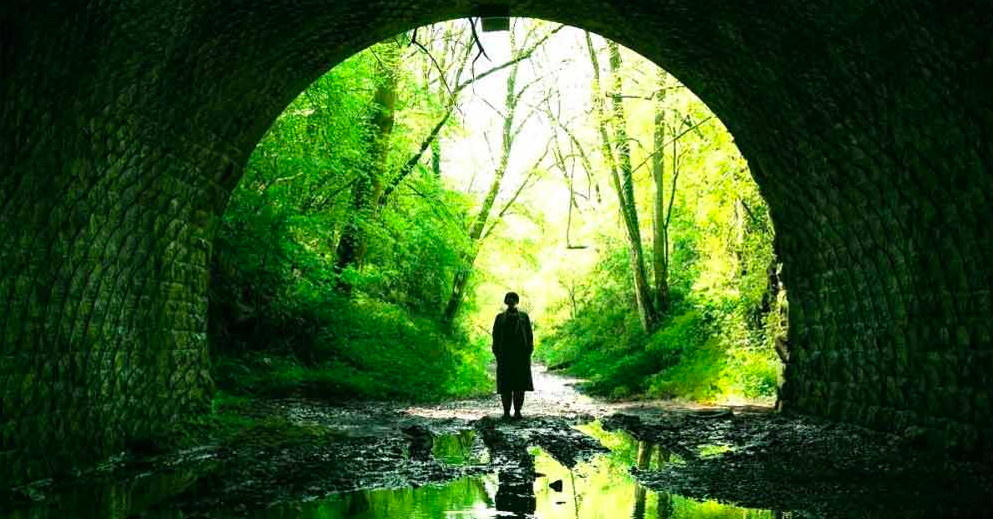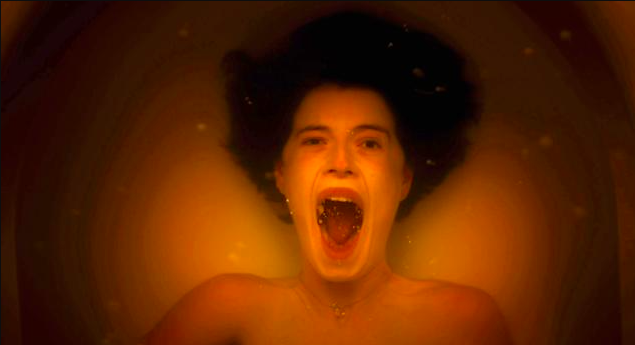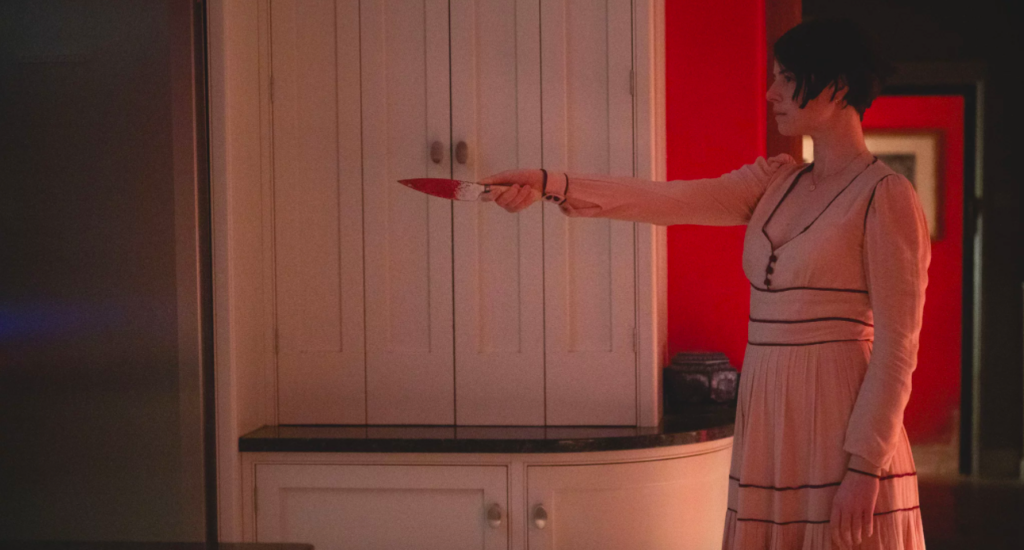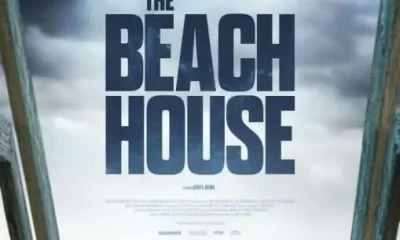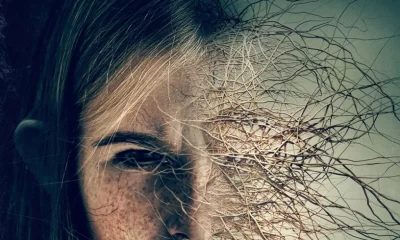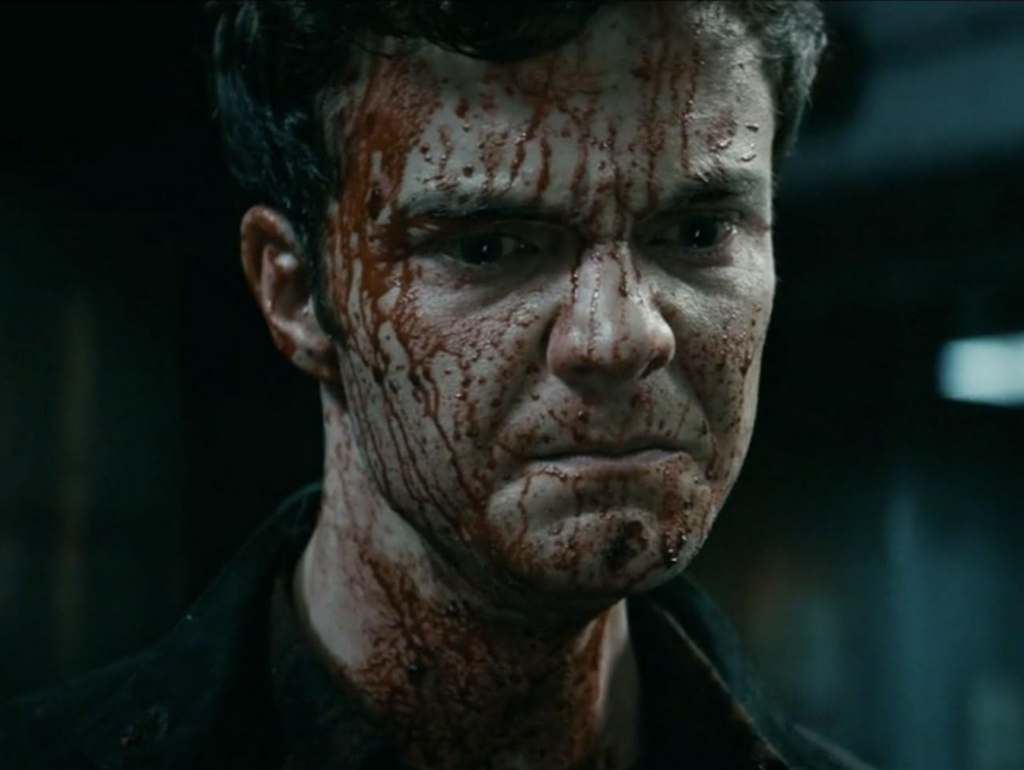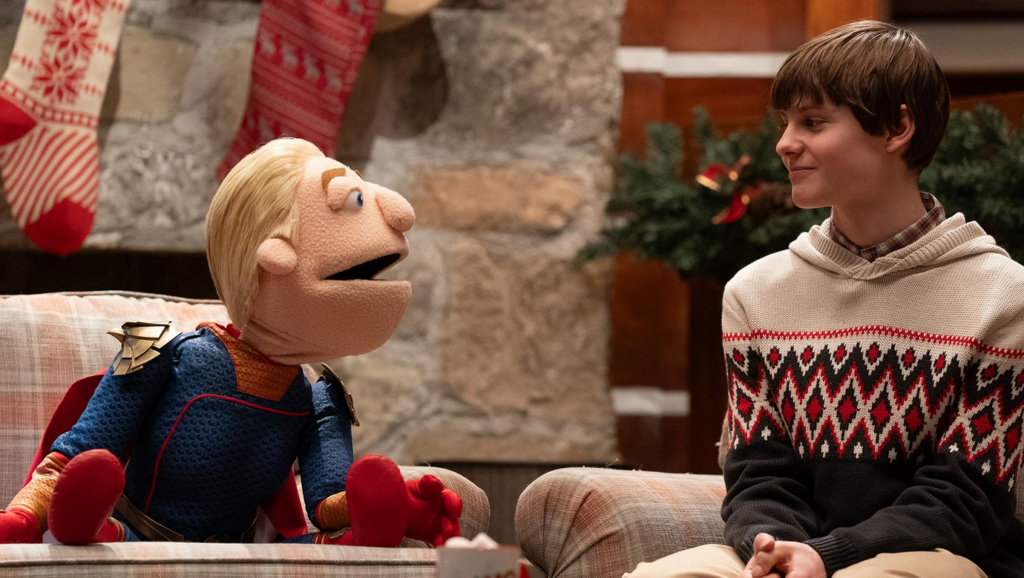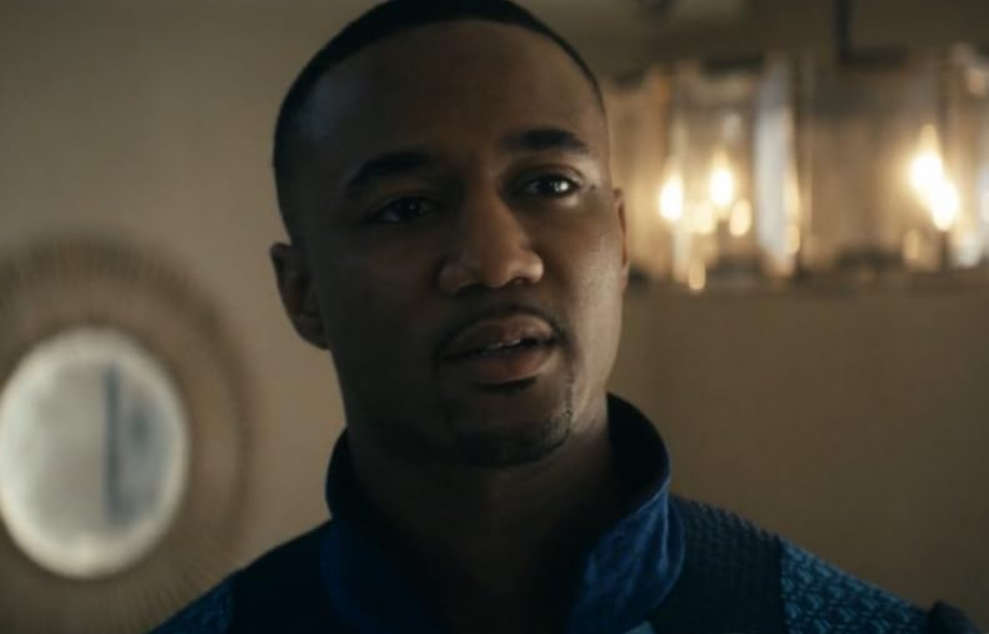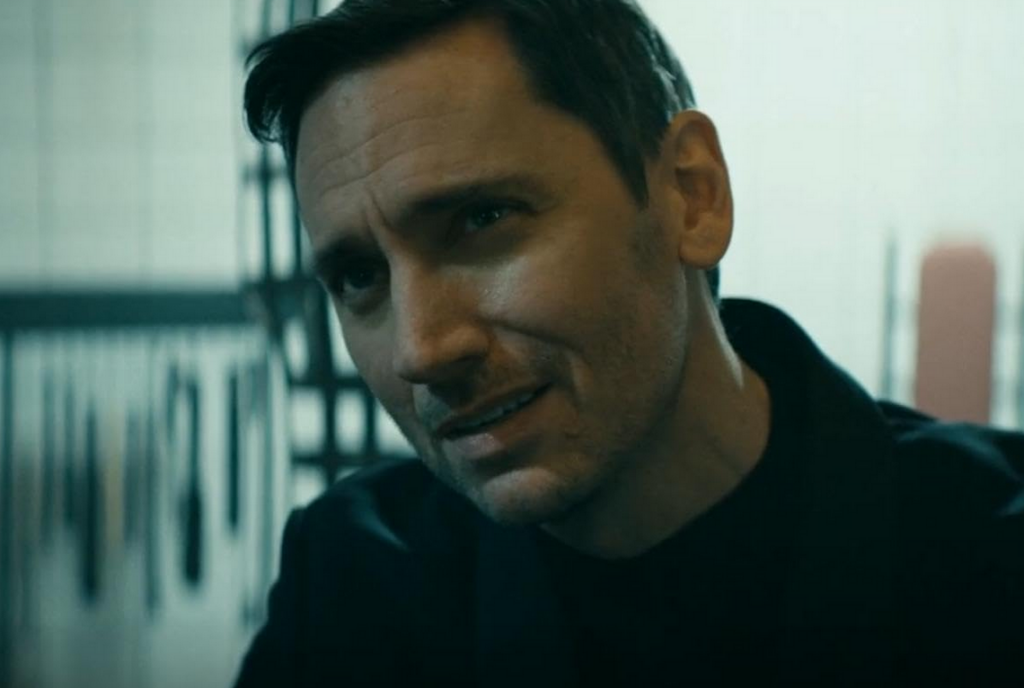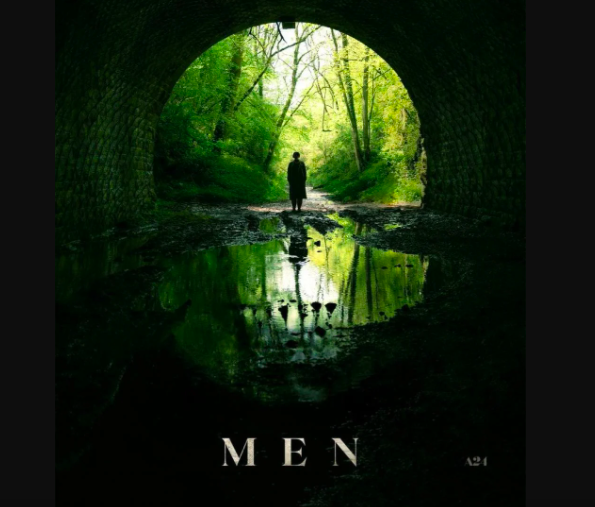
Men (2022): The Unwavering Horror of Female Solitude
More Videos
Published
2 years agoon
By
Court Court
The A24 film Men (2022) is Alex Garland’s newest and third directorial project. His previous works include Ex Machina and Annihaliation. It is evident that weird, cosmic horror is Garland’s forte and Men is certainly no exception. It is a folk, body horror tale in which the protagonist, Harper Marlowe (Jessie Buckley), is staying at an isolated farmhouse in the remote village Cotson. It is a charming place, with expansive furnished rooms, floor-to-ceiling windows, a elegant garden with an exquisite apple tree. The perfect getaway for a woman who needs time to grieve after witnessing her husband kill himself.
Loneliness is a sin for women in horror
Men is an artistic piece in every sense of the word. After getting her things settled, Harper wonders on her own to explore a nearby forest. She follows a path with flourishing green vegetation and laughs to herself when small rain drops start to fall. The imagery is gentle, even if it is exhaustively comparing womanhood to nature.
When Harper wanders to a tunnel, she plays with the acoustics and sings as loud as she can. She is at peace, hope and comfort beaming in her eyes. But of course, this is ruined when a mysterious, shadowy figure at the end of the tunnel stands up and starts running at her. It is a reminder to Harper that, whether she stays or leaves home, women cannot be left alone.
Harper wants, and has the right, to be alone and she is going to fight for it.
Any time a woman is alone in a horror movie – hell, in any movie – it is evident that she will succumb to danger one way or another. When the strange man from the tunnel appears at Harper’s rental home and threatens to break in, Harper calls the police, who tell her the man must be harmless but arrest him nonetheless. Harper later facetimes her friend Riley (Gayle Rankin), who immediately offers to do the four hour drive and stay with Harper. Harper refuses the company, to which many of us in the theater (myself included) immediately shouted “no!” How can she be alone when she is obviously in danger?
However, I thought about it more and I read Heather O’Neill’s essay on the movie, who pointed out that, “[Harper] has come to be by herself, and she is going to work through the terror of it.” Harper wants, and has the right, to be alone. And she is going to fight for it.
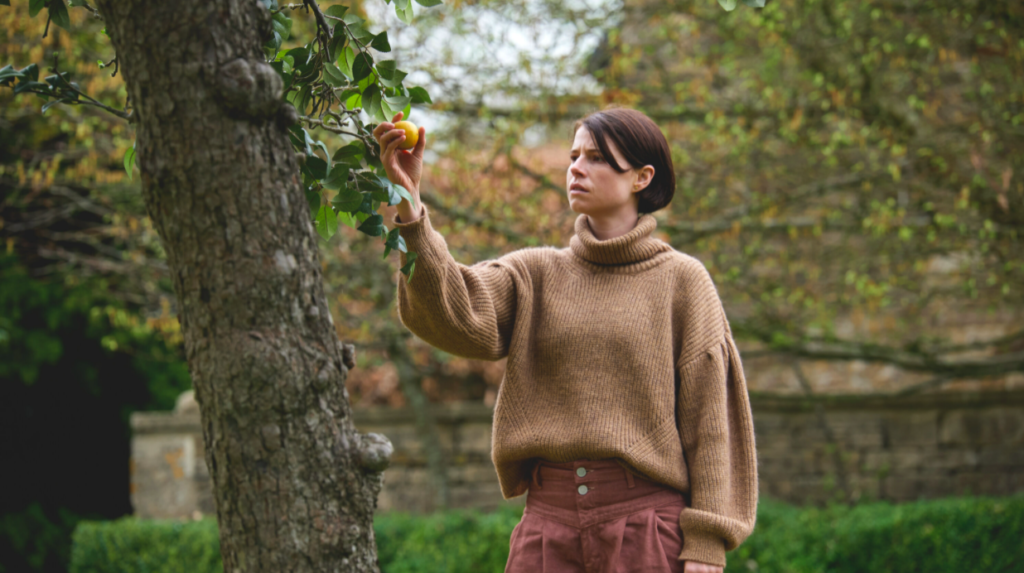
There are other small moments in the movie that I was grateful for. In the beginning, the man who owns the house, Geoffrey (Rory Kinnear), gives her a tour. In one scene there is a room with a baby grand piano and Geoffrey asked if she plays, to which she responds “no.” The host admits he also doesn’t, and they continue with the rest of the tour. But later on, it turns out that Harper knows how to play rather well.
I loved this little detail and the strength it carries. Personally, when I have admitted to a man that I can do something, more often than not he immediately needs visual proof. In this case, it’s evident that Harper did not have the emotional space or energy to prove to the host that she has the ability to do something he cannot. I can see it in my head: if she said “yes,” he would pester her to play the piano until she finally gives in just to shut him up. He would make some comment, it would be a whole thing that didn’t need to happen. Sometimes it’s just easier to not admit to men when you can do something.
A little goes a long way.
Where Men has its strengths also lie its weaknesses. The entire movie is dipped, and eventually drowns, in visual metaphors. While folk horrors rely heavily on visual metaphors, there needs to be substance to the plot and this is where Men lacks. For example, the consistent focal point is a church tabernacle whose clay artwork consists of a leaf-man on one side, and a woman with a spread-open vagina on the other. Garland goes back to this scene often, holding the viewer’s hand in case we didn’t get the reference that historically, specifically in colonial Christian societies, womanhood is defined by biology.
Another example: unless it is in fear, women historically do not scream a lot in movies. Men scream and shout as loud as they want, whether it is in anger or joy or sorrow, because in a patriarchal world men can and need to be heard. There is a moment in Men when Harper visits a church and, after exploring its artifacts, sits in a pew and screams as loud as she can. She is overcome by grief and mental reruns of her husband falling to his death. And sometimes screaming is just what a person needs to do to let it all out.
I want to see women scream more, and not just because she is running for her life. But then a priest walks up to her and points out how he noticed her scream and how she must be tormented, an immediate shutdown of her emotions. Later in the movie, we see that famous visual trope of Harper dunking her head underwater in a bathtub and screaming. This is so no one, not even in a remote house in a meagerly populated town, can hear. And it is certainly no coincidence that her mouth looks an awful lot like Men’s visual depiction of a human vagina.
Blood blood blood
Let’s not forget the bloody climactic birth scene. It is set off by the visual of apples falling from a tree, an old metaphor for fertility. Soon, all the men in the movie who either terrorized or threatened Harper’s safety give birth to each other in a tumultuous depiction of the female human life cycle. Garland’s imagery is trying very hard to prove that gender is fluid and not simply biological, but that gets lost in the bloody sauce. There is also plenty of phallus symbolism, specifically with a bloody knife, Harper’s only weapon. Symbolism meager at best.
When the movie ends after the seemingly endless birth cycle, Riley finally meets Harper at Cotson and the audience learns Riley is pregnant. At this point of the movie, that little detail is thrown in there for no reason. There is fundamentally no purpose for this detail, which maybe is the whole point. Who knows? I wouldn’t be surprised if I’m putting more thought into it than the movie’s creators.
The Verdict
Men, in short, is an all too real story of the danger women face when being alone. It is about female isolation and men’s interference with that personal space. It is not nuanced in it’s message of what happens when women are alone. Horror movies have been telling us that for as long as they’ve existed.
Don’t get me wrong, Men is well made and well written. The acting is incredible and bring this character-driven story to life. The smallest details and simplicity are where it shines best. But the cumbersome plot sadly outweighs that.
At the end of the day, Men is another movie written by a man trying to understand the female experience as simplistically, binarized, and white as possible. Its goal in not reducing our bodies to our parts fails. And, frankly, I am tired.

*All photos screenshot from the movie’s YouTube trailer*
CourtCourt is a writer, horror enthusiast, and may or may not be your favorite human-eating houseplant.

You may like
We have come now to the finale of season four of The Boys. And while it didn’t have the literal blood fireworks I wanted, someone did get ripped in half in the air. So, that’s pretty close.
As a note, I will try to avoid spoilers as much as possible. This ending was a hell of a gut punch that should be experienced as blindly as possible. That being said, I will not be able to avoid spoilers and still give a full legitimate review. Proceed at your own risk.
The story
The main storyline for this episode is the attempted assassination of President-Elect Robert Singer. The Boys join forces with the Secret Service to protect him. But, as we learned last episode, Annie has been replaced with a shapeshifter. A shapeshifter that was welcome not just into Hughie’s anus, but into the protective bunker in which the President-Elect is hiding.
What worked
The first thing I want to discuss about this episode is the ending. But we need to do this carefully.
The important thing here is that the ending breaks your heart on so many levels. So many terrible things are happening to characters that it’s almost hard to keep track. And each moment is significant to each character.
I cannot give a specific example. But no matter who your favorite character is, you’re going to weep for them.
Unless your favorite character is Sage. And this is the next thing that made this episode so fantastic.
I don’t think I’m spoiling anything to say that Sage’s plans worked out exactly as she wanted them to. And she got exactly what she wanted.
What she wanted wasn’t power. It wasn’t money or fame or vengeance. It wasn’t to win the love of anyone. She just wanted to see if she could do it.
That is a terrific, terrifying motivation! Because all she wants is to play a massive game of chess with people as pieces. She doesn’t care about anyone. She just wants to see how many people she can manipulate. She just wants to set things on fire to see if she can.
Fantastic. A plus villain work.
The next thing I want to discuss is a cornerstone of the whole series.
The morality of The Boys shifts through the series. While it’s very much a battle to save the world from overpowered super monsters, it’s also a battle for the souls of our real heroes. And in that battle, there are two warring factors. We have Hughie, always trying to bring everyone up to a better level. And we have Butcher, who has no problem at all hitting rock bottom with a shovel in hand to do some more digging.
In this episode, we saw almost every member of The Boys challenged. Will they rise to their higher angels, or sink with their demons?
On a similar note, I am so glad that the writers kind of addressed my issues with Annie. They did this by having the shapeshifter get right into her face and accuse her of thinking that she’s better than everyone.
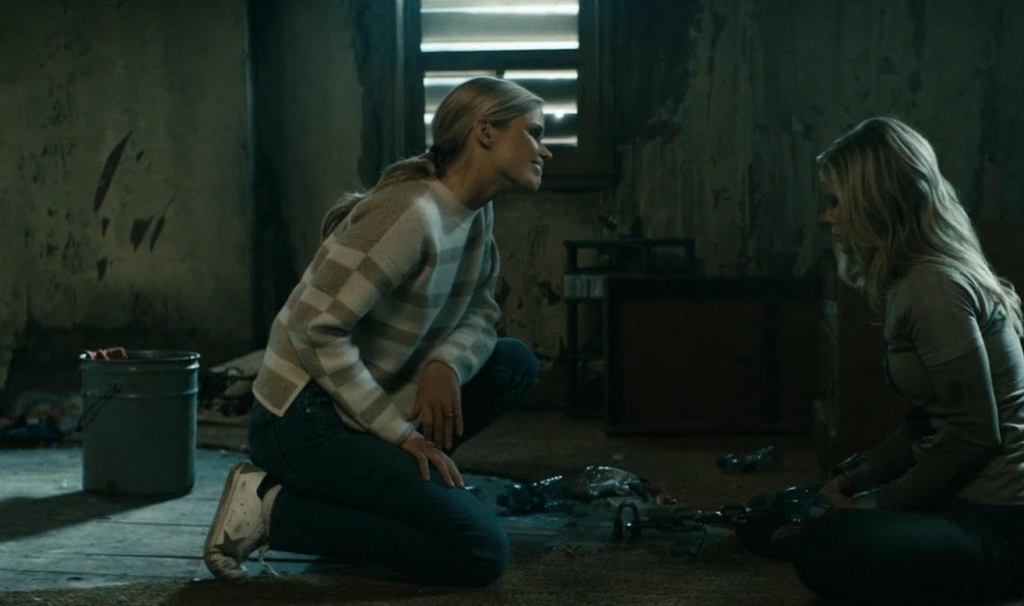
While that was devastating for the character, it was a little cathartic for those of us who felt like Annie was a little too good of a good guy.
What didn’t work
This is a small matter, but it is an issue that I want to address. After Annie finds out that Hughie slept with her doppelganger, she is furious at him.
In addition to this being unfair, it’s also a very cliche element to add. In almost every instance of a lookalike in fiction, there’s a moment where the love interest of the victim is fooled. Or almost fooled. And it’s always the same fight. It’s just played out and predictable. I’m just glad that it didn’t last very long.
Now that we’ve come to the end of the season, I can officially say that it was amazing. The story was deep and rich. The special effects were a stomach-turning good time. The character development was spot-on and satisfying. And, of course, it left me just about gagging to see what happens next. Unfortunately, it looks like we’ll have a bit of a wait. Because as of right now, the fifth season isn’t expected until 2026.

We’ve reached the second to last episode of The Boys, season four. And, as is appropriate for the penultimate episode of any show, things have to get a lot worse before they can get better.
Let’s discuss.
The story
Christmas is coming, and the whole world is getting ready. Ryan, despite being very clear that he didn’t want to appear on any TV shows or movies, has been strong-armed into participating in a Vought puppet Christmas special. He draws the line, though, when asked to sing about turning one’s parents in if they start talking about woke things.
Meanwhile, The Boys are trying to keep each other together. Butcher decides to take Sameer to the rest of the team. He also gets Frenchie out of prison, hoping they can make the Sup virus necessary to finally take down Homelander. Instead, this decision means disaster for one member of the team.
What worked
I first want to talk about Ryan’s speech near the end of the episode. Because it was exactly the moral of this whole story.
Ryan’s dad is a monster. His stepdad is also kind of a monster. But Ryan is a good kid. He cares about people, about family. And while he loves Homelander and Butcher, he doesn’t want to be like them.
Even better, this speech sounded like something a kid would say. Ryan didn’t open his mouth and start sounding like a college student all of a sudden. He sounds like a kid who misses his mom and wants to live up to the good standards she set for him. And I think that’s terrific.
Speaking of Homelander, he shot himself in the foot in this episode. I said earlier in the season that his hubris was going to be his downfall, and I was right. Without Sage, he just has the same weaknesses he’s always had. He’s going to fail because he just isn’t clever enough or patient enough to succeed.
Without Sage, I think a win is in the bag for The Boys. This isn’t to say that Homelander by himself isn’t dangerous. It’s just that he’s more like a wildfire than a controlled burn. He’s going to cause a lot of damage, but not get anything he wants out of it.
More’s the pity for him and everyone else who has to share his world.
Finally, I am thrilled with A-Train’s redemption story. I love that he wants to be a good person not to save himself, but to be a good person. His honest, pure and warm reaction to that little kid smiling at him in the last episode was heartwarming. It changed him in a moment, bringing to light a goodness that he’s been keeping under wraps for a long time.
This, along with Ryan’s courageous speech, proves once again what The Boys does so well. Yes, it’s gruesome. Yes, there’s blood and balls and batshit events. Yes, someone occasionally gets ripped in half. But there is a true human goodness in the story. One that we catch glimpses of. There are good people among the monsters. There is hope for redemption.
What didn’t work
Of course, so few things in this life are perfect, and this episode was no exception. For instance, I was irritated by the insinuation that Butcher cheated on his wife.
That just doesn’t make any sense. We’ve seen flashbacks of Billy and Becca. They were happy. He was happy. He was head over heels for her. And I don’t think it’s realistic or necessary for the character to throw in that he cheated. It does nothing to add to the story, it’s just a weird and offputting moment.
Doesn’t Butcher have enough to hate about himself? Can’t we just give him that at least he was a good husband?
Finally, I kind of hate that we ended up with Annie being caught. It’s just cliche, which is something I don’t normally say about this show. It feels lazy unless they do something very clever with it in the last episode. Which, I suppose, they might.
Next up is the season finale. And with this season being as insane as it has been, I’m expecting nothing short of bloody fireworks. And I mean literal fireworks of blood. At this point, would it surprise anyone?
 (4 / 5)
(4 / 5)
Episode six of The Boys was one of the most surprising episodes of the series so far. And that is certainly saying something. Because this season has so far been bonkers.
The story
Our episode today revolves around a party at Tek Knight’s lovely mansion. Yes, it does look just like Wayne Manor.
The Boys know that Tek Knight is working with Homelander on something, but they don’t know the details. So they decide to send Hughie in to bug the mansion.
Because that’s worked so well the other two times he’s tried to hide a bug!
It should surprise no one that this time goes no better. Hughie finds himself in Tek Knight’s basement. And by that I mean his BDSM dungeon.
Meanwhile, the party upstairs is no less disturbing. Homelander and Sage are trying to convince some well-off political donors to support a cue after the election. When pressed for details on his plan, Homelander freezes. He looks to Sage for help, but she wasn’t recently shot in the head and still in the junk food stage of her healing.
Fortunately, or unfortunately depending on your point of view, Neuman jumps in and saves the day.
What works
If I’m going to say one thing about this episode, it didn’t hold back at all. I didn’t expect them to show a character masturbating, sitting their bare behind on a cake, or spraying breastmilk into someone’s face. But every time I thought they’d cut the scene and let something be left to our imagination, they did not do that.
This is a dangerous move. Whenever you show the monster, you run the risk of them not being scary enough, or gross enough. As Stephen King says in Danse Macabre, to leave this sort of thing to the imagination if the reader makes things so much worse. So when they finally experience the monster, they might say that this isn’t so bad. It could have been so much worse.
But in this case, they managed to avoid that by making the scenes, especially the ones in Tek Knight’s dungeon, so much worse than I imagined it would be.
What doesn’t work
While this was a deeply disturbing episode in many ways, there was one really innocent and sweet moment.
And yes, I did have a problem with it.
Confronted by Firecracker, Annie decides to apologize for spreading rumors about her when they were kids. She tells her that she is genuinely sorry.
And I believe her. I don’t think Firecracker did, but I did.
So why is this an issue? Because I’m starting to think that Annie is maybe too nice. She is too good.
I know that Annie is our good guy. But every one of the other good guys has flaws. Hughie let his pride get in the way and took Temp V. MM hid himself from his daughter instead of teaching her to work through her emotions. Kimiko is far too closed off and has a hard time trusting others. Frenchie numbs himself with drugs. And well, what hasn’t Butcher done?
It is unrealistic that Annie is just so kind and so flawless. We all have shadows in our personalities. We all have weaknesses, we all mess up. We all do things we wish we could take back. The fact that Annie doesn’t seem to have anything like that is not just unrealistic. It’s infantilizing.
Give her some deep dark secrets. Give her something real to regret.
This was a shocking episode, even for someone fairly jaded like me. I wasn’t expecting the sort of weird sexual depravity, though I guess maybe I should have seen it coming. It was dark, upsetting, tense, and funny as hell. And with just two episodes left in the season, I can imagine the stakes are only going to get higher.
 (4 / 5)
(4 / 5)
By the way, if you like my writing you can get my short story, Man In The Woods, on Smashwords and Amazon.

